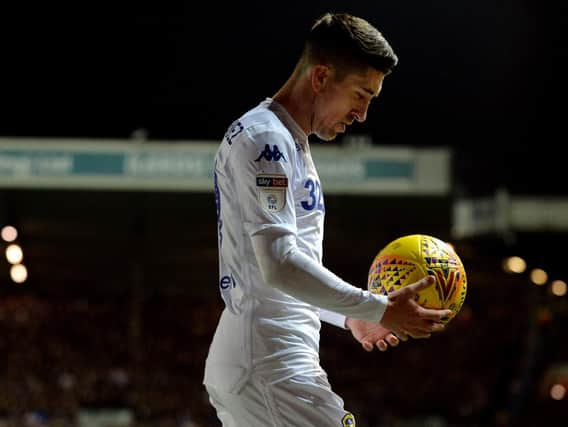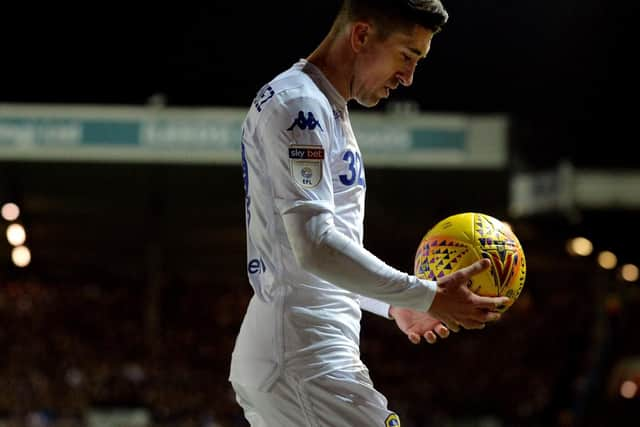Leeds United's Pablo Hernandez evoking the spirit of Gordan Strachan at Elland Road 30 years on


For Howard Wilkinson he was a perfect fit: “A cornerstone for the entire club, in terms of technical ability and leadership.”
Leeds, near the end of a long stretch below the first division, needed both attributes and when they began negotiating a transfer with Strachan they did not beat around the bush in explaining their predicament.
Advertisement
Hide AdAdvertisement
Hide Ad“It was the only time in my whole career when the people signing me said ‘we need you to do this for us’,” Strachan told the YEP in 2016. “They simply said ‘we need to get out of the second division’. So I had to help make it happen.”


Comparisons were drawn between him and Pablo Hernandez last week after Hernandez reprised the spirit of Strachan in Leeds’ 4-0 thrashing of West Brom but the pressure of chasing promotion – the sole priority of finding a way out of the hinterland – might be the part of Strachan’s story which the Spaniard relates to most.
Hernandez has travelled far, from Valencia to Swansea to the Middle East and to Yorkshire, but no other club have exposed him to so much desperation, or such a call for talismanic brilliance.
Hernandez, when Leeds signed him from Al-Arabi in 2016, had traits of Strachan on his resume; a footballer in his 30s who had lost some direction.
Advertisement
Hide AdAdvertisement
Hide AdManchester United, and Alex Ferguson in particular, were done with Strachan when they let him go and Hernandez had left top-level football behind by taking a wealthy offer from Qatar. He never disguised the fact that in quitting Swansea City for Doha and leaving his family behind in Spain, he was making a lifestyle choice.
“I knew the level in Qatar wasn’t the same,” Hernandez said, “but the money was good.”
Before finding his way to Old Trafford, Strachan was part of the finest Aberdeen team, the last to outwit the Old Firm in Scotland, but Leeds inspired the form of his life. Hernandez has La Liga and Premier League games on his record and lasting respect at a major club in Valencia but, at 33, he is in the latter stages of arguably his finest season to date. He has never scored more often in a single campaign and the Championship is trailing behind his tally of 11 assists. In a team that has racked up 59 league goals, Hernandez has contributed to a third of them.
Strachan was a naturally fit footballer, never prone to lasting injuries at Elland Road, and his approach to training was like his personality.
Advertisement
Hide AdAdvertisement
Hide Ad“Even at 35 I had to train 100 per cent,” he said. “If I’m training at 70 per cent, what happens when Liverpool or Manchester United turn up? You can’t just turn it on.”
Hernandez has had intermittent hamstring issues, including one suffered in the first month of this season, and Leeds have learned to manage his condition carefully but the midfielder, the oldest player in United’s squad, has a comparable burden of responsibility. He spoke about it last week, as the club licked their wounds after a bad night away at QPR.
“In the difficult moments of the games the players need to take responsibility,” Hernandez said. “In some moments I need to take this responsibility because I have experience.”
It came through in Friday’s win over West Brom with the fourth-fastest goal Leeds have ever scored, 16 seconds into the game. Albion exposed themselves at the kick-off by overloading one side of the field and losing the ball immediately, allowing Hernandez to take advantage of the space in front of him by drifting off the other flank into the middle of the pitch.
Advertisement
Hide AdAdvertisement
Hide AdWest Brom’s disorganisation gave him time to plant the ball into Sam Johnstone’s top corner from 20 yards. Hernandez’s tendency to roam, and to do so intelligently, is a reason why Marcelo Bielsa has persisted with him in a wide role, even after Samuel Saiz’s exit to Spain and despite the fact that Hernandez no longer has the pace to ravage full-backs as an out-and-out winger.
Bielsa has used his touch and vision to create numerical advantages around the opposition box, relying on his ability to draw defences out by exchanging accurate short passes under pressure.
The sweeping, crossfield switches of play which Hernandez specialises in are less crucial than his willingness to take the ball on with bodies around him.
When Hernandez first signed for Leeds, in the early months of Garry Monk’s reign as manager, the transfer was an educated and convenient punt: comparatively cheap and a short-term gamble on a forgotten player with proven pedigree. United loaned him from Al-Arabi initially and then signed him on a permanent deal which ran to the end of last season.
Advertisement
Hide AdAdvertisement
Hide AdThere was a point this time last year where Hernandez’s future was questionable, as he and Leeds haggled over the length of an extension, but a two-year contract was enough to convince him to stay.
Bielsa, had he been in the building back then, would have considered the retention of Hernandez a necessity. Hernandez was his sort of player and in the space of eight months, the midfielder has reached a different level at Elland Road, bringing promotion as close as it has been in 15 years.
Lucidity, instinct, a silent leader: those were the descriptions of him Bielsa reached for when Leeds were taking the Championship to town in August and, if Hernandez can relate to Strachan’s impact almost 30 years ago, Wilkinson might appreciate Bielsa’s answer to the question of whether he could improve a player so advanced in years.
“I think he can make me a better head coach,” Bielsa replied.